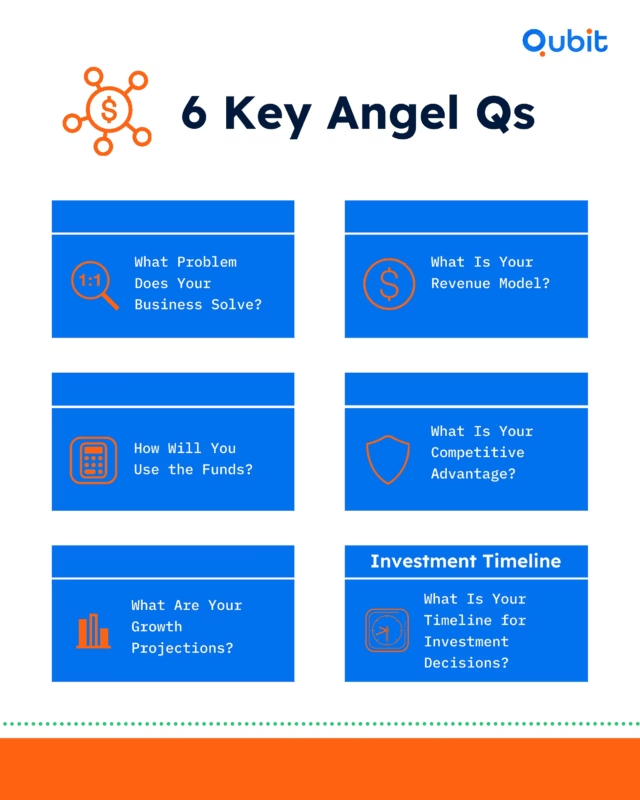Recent market activity underscores why investors demand thorough answers. In Q1 2025, global venture capital investment grew from $118 billion to $126 billion. This uptick included eight $1 billion-plus rounds and a landmark $40 billion OpenAI transaction. Founders face rising scrutiny as deal competition intensifies.
Understanding an investor’s priorities, expectations, and approach ensures alignment and sets the stage for a productive partnership. However, the process involves more than just presenting your pitch—it’s equally important to ask the right questions.
Angel investors often pose critical questions to evaluate your business's potential, and understanding their motivations and processes can help you respond effectively. Below, are some essential questions founders should anticipate and provide actionable insights to guide your approach.

1. What Problem Does Your Business Solve?
Angel investors prioritize businesses that address significant market gaps. Be prepared to articulate the problem your product or service solves, backed by data or customer feedback. For example, Ola Cabs secured ₹1 crore ($150k) in early-stage funding. They demonstrated the need for a reliable ride-hailing service in India. This initial investment later yielded a 40.7x ROI after SoftBank’s Series D funding.
2. What Is Your Revenue Model?
Investors want clarity on how your business generates income. Whether it's subscription-based, transactional, or ad-supported, ensure your revenue model aligns with your target audience and market trends.
3. How Will You Use the Funds?
Transparency is key when discussing fund allocation. Break down how the investment will be used—whether for product development, marketing, or scaling operations. This demonstrates strategic planning and builds investor confidence.
4. What Is Your Competitive Advantage?
Angel investors often ask about your unique selling proposition (USP), which is what differentiates your business from competitors. Highlight what sets your business apart, such as proprietary technology, exceptional customer service, or a first-mover advantage.
5. What Are Your Growth Projections?
Investors are keen on understanding your vision for scalability. Share realistic growth projections, supported by market research and historical performance.
6. What Is Your Timeline for Investment Decisions?
Individual angel investors typically require 2-3 meetings before committing to funding, with decisions often finalized within 4-6 weeks. Founders should anticipate this Funding Timeline and prepare accordingly.
Refining Your Approach
As you refine your queries for angel investors, personalizing communication with investors introduces methods to tailor your message, ensuring it resonates with distinct investor profiles. This approach can help you frame your responses in a way that aligns with each investor’s priorities.
Navigating Interactive Investor Pitches
Building on your preparation for investor questions, founders should anticipate interactive pitch meetings where investors may interrupt frequently. Practicing concise responses and staying focused on key points helps maintain clarity under pressure. Adapting your delivery in real time demonstrates confidence and flexibility, which investors value. This approach ensures you address concerns directly while keeping the conversation productive.
These key questions and preparing thoughtful responses can significantly improve your chances of securing funding. By addressing investor concerns proactively, you demonstrate professionalism and a clear vision for your business.
Is Your Startup Ready for Investors? Take This Self-Assessment
Before diving into investor discussions, founders must evaluate critical aspects of their business and personal readiness. This self-assessment will help you reflect on key factors such as equity dilution, control relinquishment, exit timelines, and building strong investor relationships.
- Are you comfortable with equity dilution?
- Are you prepared to share control with investors?
- Are your exit goals aligned with investor timelines?
- Do you have a clear plan for building investor relationships?
1. Equity Dilution: Are You Comfortable Sharing Ownership?
Equity dilution means giving up part of your ownership in exchange for investor capital. Accepting investments often means giving up a portion of your ownership in exchange for capital. Ask yourself: Are you ready to balance the trade-off between funding and retaining control? Understanding how much equity you’re willing to part with, and its impact on decision-making, is essential before approaching investors.
2. Relinquishing Control: Can You Share Decision-Making Power?
Investors typically expect a say in strategic decisions. Are you prepared to collaborate and adapt to external input? This shift can be challenging for founders accustomed to full autonomy. Reflect on whether your leadership style aligns with shared control and accountability.
3. Exit Timelines: Do Your Goals Align with Investor Expectations?
Investors often have clear expectations for exit strategies and timelines. Whether through acquisition, IPO, or another route, aligning your vision with theirs is crucial. Consider whether your long-term goals match the typical investor’s desire for returns within a specific timeframe.
4. Building Investor Relationships: Are You Ready for Transparent Communication?
Establishing trust and maintaining open communication with investors is vital. Missteps in dialogue can strain relationships and jeopardize funding opportunities.
Thorough readiness can yield outsized returns. The experience of a self-taught angel who backed two unicorns from the seed stage exemplifies this. Their strategic diligence at early stages enabled successful identification and support of high-growth opportunities. Founders benefit from applying similar rigor to their own assessment.
The examination of key investor questions gains further clarity when common mistakes in investor communication are considered, outlining typical pitfalls that could affect your exchanges. Taking this self-assessment is not just about identifying gaps but also preparing to address them. By introspecting on these areas, you’ll be better equipped to approach investors with confidence and clarity.
Legal and Business Tips to Secure Angel Funding
Securing angel funding requires a strong grasp of both legal frameworks and strategic business practices. For startups, understanding the legal advice for startups is essential to avoid pitfalls that could hinder investment opportunities. One critical step is ensuring the term sheet (the document outlining the investment's key terms) is thoroughly reviewed. This process helps founders identify clauses that may impact control, equity, or future funding rounds.
Beyond legal considerations, maintaining effective communication with investors is equally vital.Your review of foundational investor questions is further complemented by insights on how to write investor updates, which discuss maintaining structured, engaging communication with investors. Regular updates not only keep angel investors informed but also demonstrate transparency and accountability, fostering long-term trust.
Stay Updated With the Latest Insights From Experts
Staying informed about industry-specific knowledge can be a game-changer for biotech startups. This section aggregates expert articles that delve into critical topics such as legal considerations, tax advantages through Qualified Small Business Stock (QSBS), and funding strategies tailored to the biotech sector.
Understanding the role of a venture capital attorney is pivotal for startups navigating complex legal landscapes. These professionals provide guidance on structuring deals, protecting intellectual property, and ensuring compliance with regulations. Additionally, QSBS (Qualified Small Business Stock) offers significant tax benefits for investors, making it a crucial topic for founders seeking to attract funding.
A key compliance marker for 2024 is the SEC requirement for Large Accelerated Filers to file their 10-K within 60 days after fiscal year-end. The deadline, March 3 SEC filing deadline, signals rising scrutiny for biotech and growth startups. Staying ahead of evolving legal frameworks is vital for founders.
Funding considerations for biotech startups often involve unique challenges, including high research costs and long development timelines. Expert insights can help founders identify the right funding sources, whether through venture capital, angel investors, or government grants.
The discussion around angel investor questions aligns naturally with perspectives on the importance of transparency with investors, clarifying how clear and candid dialogue fosters credibility. In first meetings, signal rigor without killing the vibe. Vc intro call questions offers concise prompts that surface founder clarity, customer pain, and go-to-market realism.
Find the Perfect Angel Investor With Expert Advice
Choosing the right angel investor can significantly impact your startup's trajectory. Beyond financial backing, the ideal investor offers strategic value that aligns with your business goals.
Strategic investors can drive growth at meaningful scale. Rebel Fund, for example, has invested in over 250 Y Combinator portfolio companies, collectively valued in the tens of billions. Their well-defined investment strategy leverages checklists and a minimum $500K commitment to filter top prospects. Founders seeking more than cash should prioritize such due diligence-driven partners.
The Value of Early Investor Relationships
Beyond evaluating investor qualities, founders benefit from building relationships with potential angels before seeking funding. Early networking allows you to understand an investor’s style and priorities without the pressure of a pitch. This groundwork fosters trust and reveals alignment, making future negotiations smoother. Establishing rapport early can also lead to valuable introductions and insights.
1. Scalable Support
An angel investor should provide more than just capital. Look for someone who can guide your startup through scaling challenges, offering insights into market expansion and operational efficiency.
2. Hiring Assistance
Building a strong team is crucial for growth. Investors with a robust network can connect you to top talent, ensuring your startup attracts the right people for key roles.
3. Future Funding Facilitation
The best angel investors pave the way for future funding rounds. Their credibility and connections can open doors to venture capital firms and other funding sources, making subsequent fundraising smoother.
4. PR Expertise
Visibility matters. Investors with experience in public relations can help amplify your brand’s presence, ensuring your startup gains recognition in competitive markets.
5. Consistent Mentorship
A great investor acts as a mentor, offering consistent guidance and constructive feedback. Their experience can help you navigate challenges and make informed decisions at critical junctures.
Selecting the right angel investor is about finding a strategic partner who aligns with your vision and can actively contribute to your startup’s success.
Be Ready for Common Challenges With Angel Investors
One common issue is mismatched time commitments—some investors may expect frequent updates, while others might adopt a hands-off approach. Founders must clarify engagement levels early to avoid misunderstandings. Another challenge arises from differing priorities; an investor’s vision for the business may not align with the founder’s goals. To address this, establish clear expectations during initial discussions and formalize agreements in writing.
Active vs. Passive Angel Investors
| Characteristic | Active Investor | Passive Investor |
|---|---|---|
| Engagement Level | Frequent guidance and regular check-ins | Minimal involvement after initial investment |
| Decision Influence | May seek input on key decisions | Rarely involved in operations |
| Resource Access | Provides network and mentorship | Offers capital with limited support |
Extra Tools to Help You Prepare for Investors
Enhancing your investor readiness often requires diving deeper into expert resources. Explore books like Pitch Anything by Oren Klaff for advanced pitching techniques or Venture Deals by Brad Feld and Jason Mendelson for insights into deal structuring. Online platforms such as Crunchbase and AngelList can also provide valuable data on investor trends and profiles. Additionally, consider joining webinars hosted by industry leaders to refine your approach. These tools can sharpen your strategy and boost your confidence during investor engagements.
Investor readiness pays off in global deal volume. Private Technology Growth funds have raised $220 billion since 2009, according to CAIA industry analysis. Leveraging expert guidance and platforms helps founders navigate these funding pools effectively.
Conclusion
Securing funding for your startup requires more than just a compelling idea, it demands thorough preparation and strategic execution. From conducting comprehensive due diligence to assessing your business honestly, these steps lay the groundwork for attracting the right investors. Selecting investors who align with your vision is equally critical, ensuring a partnership that fosters growth.
Clear communication with investors and a legally sound structure are pivotal for building trust and avoiding pitfalls. Additionally, refining your pitch deck to highlight your startup’s unique value proposition can significantly enhance your chances of securing proper funding.
If you're ready to take the next step, explore our Investor Discovery and Mapping service to connect with the perfect angel investor for your startup. Let’s get started today!
Key Takeaways
- Ask better questions, not more questions. You are screening for alignment, not compliments.
- Lead with clarity on problem, customer, and traction. Investors decide fast, so your first answers must land clean.
- Explain the revenue engine in plain math. How you make money, why it scales, and what breaks it.
- Make fund use concrete. Tie the raise to 3–5 milestones, timelines, and what changes if you raise less or more.
- Prove your edge with evidence. Show why you win, not why competitors are “bad.”
- Keep projections defensible. Use simple assumptions and be ready to explain the inputs.
- Expect a real timeline. Most angels need multiple conversations, so plan follow-ups and momentum.
- Know your dilution and control limits upfront. If you cannot explain your cap table, do not start fundraising.
- Alignment beats cash. The best angels bring intros, hiring help, and credibility for the next round.
- Communication is part of the deal. Consistent updates and fast follow-through build trust faster than hype.
Frequently asked Questions
What legal documents should I prepare before meeting angel investors?
Before meeting angel investors, prepare your term sheet, cap table, and pitch deck. These documents help clarify investment terms, equity structure, and business vision.






